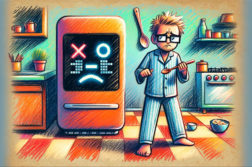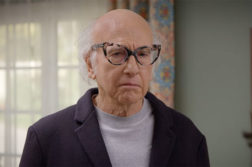Any day now, apparently, we’ll finally be given the timetable for the field trials of the Rudd Government’s mandatory internet "filtering" system. But as Phase II of the trials begins, so does Phase II of selling this controversial censorship policy to the public.
Gone is Senator Stephen Conroy and his unsubtle tactic of calling his opponents paedophiles. Gone is ChildWise’s Bernadette McMenamin and her thoroughly debunked claims about the prevalence of paedophiles and child pornography.
In steps the smart, media-skilled moral warrior, Brigadier Jim Wallace (retired) — former commander of Australia’s elite SAS Regiment in Vietnam and now managing director of the Australian Christian Lobby.
Yet in supporting this secretive, unaccountable and all-pervasive censorship system, Wallace uses the same emotion-laden "somebody-think-of-the-children" rhetoric, the same misrepresentations of what the filter will block, and the same misrepresentations of the numbers as his predecessors. The only real change from Phase I is that Wallace’s War on Filth is a little bit more sophisticated.
It’s worth re-reading his opinion piece for the Fairfax media last week, listening to his interview on ABC Radio National’s Life Matters, or reading the transcript to see how he operates.
First, Wallace claims the mandatory tier of filtering would block only "illegal" material, immediately linking it with the scary words "child pornography". From the ABC interview:
"It is very clear in the government’s intent that would only apply to illegal material, primarily we’re dealing here with child pornography."
This simply isn’t true. As Irene Graham has meticulously documented at Libertus.net, what will be blocked — at least according to Senator Conroy’s current description of the plan — is "the ACMA blacklist". The blacklist is already part of Australia’s existing internet censorship regime.
Graham notes that "[as]at 30 November 2008, less than half the URLs on ACMA’s blacklist involve child pornography, and the number could be significantly less than half".
As well, legal material can be added to the blacklist, even material which isn’t pornographic or sexual in nature, such as anything rated (or potentially rated) MA15+ but which doesn’t have an age-verification mechanism. One recent example was the blacklisting of a US anti-abortion website showing photographs of dismembered aborted foetuses — confronting material, yes, but not illegal.
Second, Wallace uses verbal judo to deflect anyone who points out the reality of the blacklist’s content.
"…[It’s] a clear intent of the Government … that it is not looking at mandatorily blocking anything that is legally available.
"…People [can]make the decision to opt in for anything that is legal. Now clearly, refused classification is illegal. Child pornography is illegal, and this is all that’s been talked about in mandatory blocking."
In fact the Government’s intention is far from clear. ALP policy uses the terms "inappropriate" and "harmful". They and words like "unwanted" have been jumbled together. Again, Irene Graham has documented the twists and turns in AU Gov’t Mandatory ISP Filtering / Censorship Plan.
Third, Wallace performs sleight-of-hand with any numbers which do come up, knowing that most people skim over them. The emotive material is what counts.
His Fairfax piece quotes the claim, from the Australia Institute’s 2003 report Youth and Pornography in Australia: Evidence on the extent of exposure and likely effects by Clive Hamilton and Michael Flood, that 93 per cent of parents of 12- to 17-year-olds want automatic filtering of the internet.
Later, Wallace quotes further: "Eighty-four per cent of boys and 60 per cent of girls say they have been exposed accidentally to sex sites on the internet and two in five boys deliberately use the internet to see sexually explicit material, with 4 to 5 per cent doing so frequently…
"There are special concerns regarding violent and extreme material on the internet including depictions of non-consenting sexual acts such as rape and bestiality."
The figures are for "sex sites" and "sexually explicit material", but Wallace’s non sequitur jump to "rape and bestiality" misleads us into imagining they refer to this substantially more disturbing but much rarer material. He also fails to mention that we’re not talking about the 12- to 17-year-olds discussed earlier, but 16- to 17-year-olds only — that is, youths who are legally permitted to have sex themselves, just not to look at pictures of other people having sex.
Wallace accuses GetUp!’s "Save The Net" campaign of cherry-picking numbers from the Government’s Phase I lab tests, but forgets to mention that the filters which "only" degraded internet performance by less than 2 per cent were also those with the most appalling false positive rate. He completely avoids the numerical analyses which point out that even the best filter tested — with a 3 per cent false positive rate — would mean for a medium-sized ISP some 3000 incorrect blocks every second, and that every time that filter blocks something there’s an 80 per cent chance it was wrong.
Fourth, Wallace portrays the internet as a free-for-all, when in fact we already have an internet censorship system in Australia, based on ACMA takedown notices for content hosted in Australia or the blacklist for material hosted overseas.
Fifth, Wallace says we’re merely implementing censorship just like we have for films and books and DVDs. In fact, it’s very different. All other media are either self-regulated or content is classified by the Australian Classification Board, openly and with an appeals process. The ACMA blacklist is secret, with special changes to the Freedom of Information Act to ensure its secrecy, and with no appeals process.
Finally, Wallace tries to convince us that support for compulsory internet filtering is widespread. Yet the only research that he or anyone else supporting the filter can point to is that 2003 Australia Institute report. Commissioned by Clive Hamilton (who in a recent polemic decried the "radical individualism of modern affluent societies") this report was conducted by Newspoll (who have been caught push-polling before) and has never been independently verified.
Actually, it’s opposition to the filter which is widespread: including that of the federal Opposition, The Greens, Save the Children (who’ve rolled up their sleeves and done the dirty work of protecting kids since 1919), the National Children’s and Youth Law Centre and even ultra-conservative Liberal Senator Cory Bernardi and Glenn Milne.
GetUp!’s campaign has more than 95,000 signatures and has raised $50,000. A survey of more than 9700 customers of mid-ranking ISP Netspace — roughly 10 per cent of their customer base plus a few outsiders — showed that 79 per cent either disagreed or strongly disagreed with the Government policy.
The Sydney Morning Herald‘s letters editor says: "There was near unanimity on the date when the Federal Government’s internet filter should be implemented — never. One or two sided with Jim Wallace’s opinion piece, but many more put cogent and scornful arguments against."
So where does the support come from? As Electronic Frontiers Australia’s timeline shows, it appears to have started with Clive Hamilton. Then, as Irene Graham writes:
"Since Nov 2004, there have been at least 35 petitions tabled calling for mandatory ISP-level filtering… 24 of them are a petition form published by the Australian Family Association (which is actually a religious right organisation). Those petitions also want ISPs to be subject to ‘liability for harm caused to children by inadequate efforts to protect minors from exposure’."
In 2006 Senator Conroy presented the key petition supporting the current policy, with 20,646 signatures, the bulk of which were gathered through churches. The remaining 11 petitions are copies of that, with from 18 to 145 signatures each.
And now we have Jim Wallace’s Australian Christian Lobby as the focus — an organisation whose "vision" sees "Christian principles and ethics accepted and influencing the way we are governed", and which is connected closely with the evangelical churches.
Donate To New Matilda
New Matilda is a small, independent media outlet. We survive through reader contributions, and never losing a lawsuit. If you got something from this article, giving something back helps us to continue speaking truth to power. Every little bit counts.



